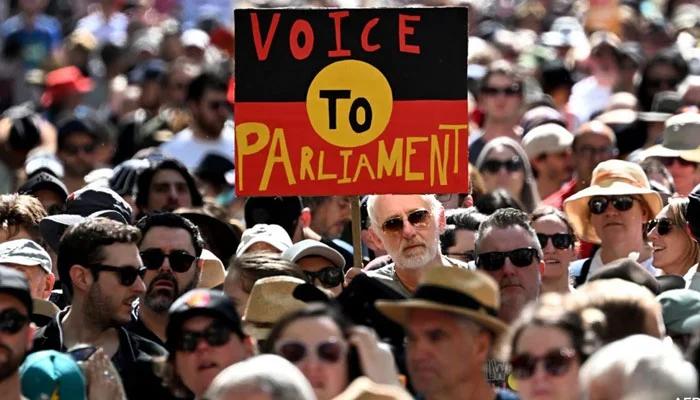Thousands of Australians gathered on Sunday to rally to support a significant Indigenous rights reform that has been losing ground in the polls ahead of an October 14 referendum.
Tens of thousands participated in “Walk for Yes” events in major cities in anticipation of the vote that could grant Indigenous Australians a constitutionally protected right to be consulted on policies affecting them, often referred to as a “Voice”.
More than two centuries since British colonisation, Indigenous people, whose ancestors have inhabited the continent for approximately 60,000 years, still face shorter lifespans, inferior education, and a disproportionately higher likelihood of dying in police custody compared to other Australians.
“I believe we need a voice in parliament, and I think it’s high time,” remarked Laurel Johnson, a 58-year-old retired Indigenous community services worker who joined hundreds at the Sydney rally, many seeking shade during a spring heatwave. When asked if the Voice would improve the conditions of Indigenous people, she replied, “I sincerely hope so.”
Her sister, Priscilla Johnson, 53, pointed out that some Indigenous people still lived in “Third World” conditions. “Australia is considered a First World country. The poor social determinants of health have persisted since the 1788 invasion,” she stated, referring to the arrival of the First Fleet that established a British penal colony in Australia.
In Melbourne, over 10,000 supporters marched through the streets, some holding banners that read: “You’re the voice, vote yes.” Thousands more gathered in cities such as Canberra, Perth, Brisbane, Darwin, Hobart, and Alice Springs.
The “Vote Yes” campaign, initiated just weeks ago by Prime Minister Anthony Albanese, faces a challenging path. Recent surveys indicate that around 60 per cent oppose the reform, while 40 per cent support it, nearly reversing the situation from a year ago.
To pass, the referendum requires majority support across Australia and a majority in at least four of the six states. Voting is compulsory, with non-voters facing a fine of 20 Australian dollars (US$13).
Voters will be asked: “A Proposed Law: to alter the Constitution to recognise the First Peoples of Australia by establishing an Aboriginal and Torres Strait Islander Voice. Do you approve this proposed alteration?”
Opponents, including the conservative opposition, argue that the reform would grant special privileges to Indigenous peoples and add an unnecessary layer of bureaucracy. They also express concerns about the lack of detailed information on how the Indigenous Voice would function, with the exact process to be debated and legislated by parliament if the “yes” vote prevails.
In an effort to change the national sentiment, the “yes” campaign launched a television advertising campaign featuring an Indigenous boy who questions, “Will I grow up in a country that hears my voice? Will I live as long as other Australians? Will I get to go to a good school?” Cameron Lum, a 34-year-old supporter of the Voice proposal, stated that he joined the Sydney rally to back “long overdue change in this country” and believes it will lead to significant policy changes led by First Nations people.



Comments are closed.